China and the US: Realism and Idealism in International Relations
VerifiedAdded on 2023/06/10
|6
|1518
|107
Essay
AI Summary
This essay explores the intricate relationship between China and the United States through the framework of International Relations (IR) theories, specifically Realism and Idealism. It begins by defining IR and outlining the core tenets of Realism, which emphasizes nation-states' pursuit of power, and Idealism, which focuses on international cooperation and the declining importance of military power. The essay then applies these theories to the historical and contemporary dynamics of Sino-U.S. relations, highlighting instances where each theory is evident. From early signs of Idealism in the early 20th century to the shift towards Realism during the Vietnam War and more recently under the Trump administration, the analysis reveals a constant fluctuation between cooperation and competition. The essay concludes by noting that the interplay between Realism and Idealism continues to shape the evolving relationship between China and the United States, influenced by changes in leadership and geopolitical priorities.
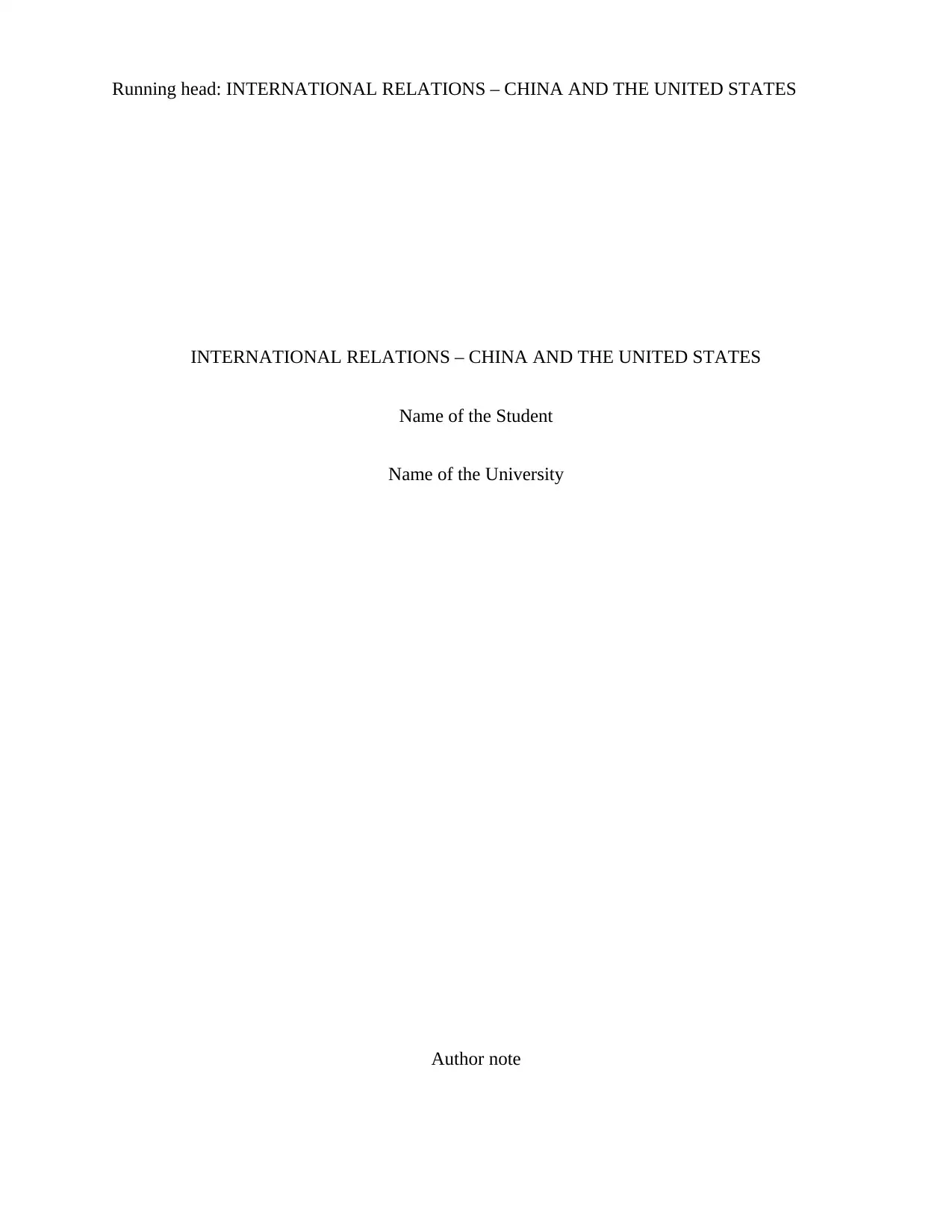
Running head: INTERNATIONAL RELATIONS – CHINA AND THE UNITED STATES
INTERNATIONAL RELATIONS – CHINA AND THE UNITED STATES
Name of the Student
Name of the University
Author note
INTERNATIONAL RELATIONS – CHINA AND THE UNITED STATES
Name of the Student
Name of the University
Author note
Paraphrase This Document
Need a fresh take? Get an instant paraphrase of this document with our AI Paraphraser
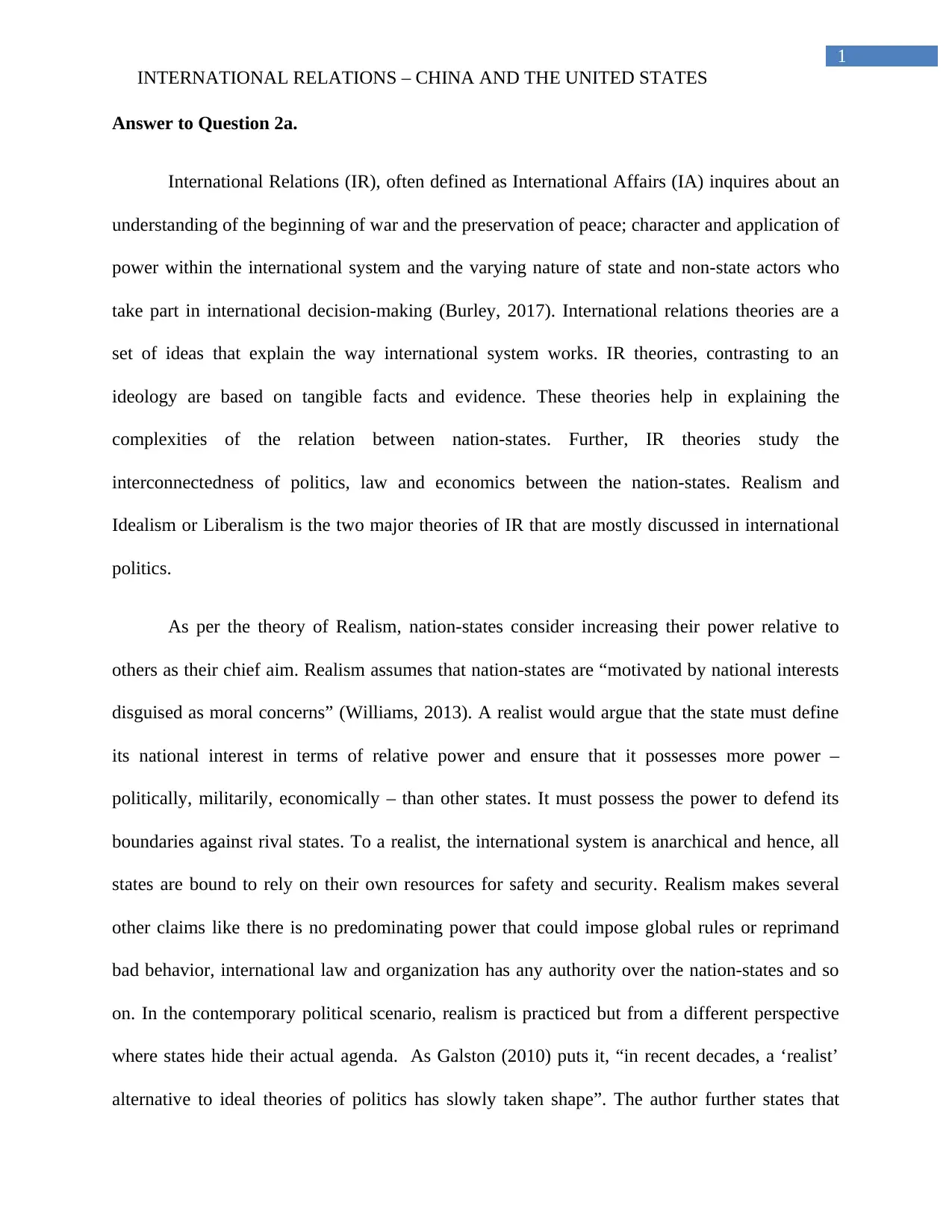
1
INTERNATIONAL RELATIONS – CHINA AND THE UNITED STATES
Answer to Question 2a.
International Relations (IR), often defined as International Affairs (IA) inquires about an
understanding of the beginning of war and the preservation of peace; character and application of
power within the international system and the varying nature of state and non-state actors who
take part in international decision-making (Burley, 2017). International relations theories are a
set of ideas that explain the way international system works. IR theories, contrasting to an
ideology are based on tangible facts and evidence. These theories help in explaining the
complexities of the relation between nation-states. Further, IR theories study the
interconnectedness of politics, law and economics between the nation-states. Realism and
Idealism or Liberalism is the two major theories of IR that are mostly discussed in international
politics.
As per the theory of Realism, nation-states consider increasing their power relative to
others as their chief aim. Realism assumes that nation-states are “motivated by national interests
disguised as moral concerns” (Williams, 2013). A realist would argue that the state must define
its national interest in terms of relative power and ensure that it possesses more power –
politically, militarily, economically – than other states. It must possess the power to defend its
boundaries against rival states. To a realist, the international system is anarchical and hence, all
states are bound to rely on their own resources for safety and security. Realism makes several
other claims like there is no predominating power that could impose global rules or reprimand
bad behavior, international law and organization has any authority over the nation-states and so
on. In the contemporary political scenario, realism is practiced but from a different perspective
where states hide their actual agenda. As Galston (2010) puts it, “in recent decades, a ‘realist’
alternative to ideal theories of politics has slowly taken shape”. The author further states that
INTERNATIONAL RELATIONS – CHINA AND THE UNITED STATES
Answer to Question 2a.
International Relations (IR), often defined as International Affairs (IA) inquires about an
understanding of the beginning of war and the preservation of peace; character and application of
power within the international system and the varying nature of state and non-state actors who
take part in international decision-making (Burley, 2017). International relations theories are a
set of ideas that explain the way international system works. IR theories, contrasting to an
ideology are based on tangible facts and evidence. These theories help in explaining the
complexities of the relation between nation-states. Further, IR theories study the
interconnectedness of politics, law and economics between the nation-states. Realism and
Idealism or Liberalism is the two major theories of IR that are mostly discussed in international
politics.
As per the theory of Realism, nation-states consider increasing their power relative to
others as their chief aim. Realism assumes that nation-states are “motivated by national interests
disguised as moral concerns” (Williams, 2013). A realist would argue that the state must define
its national interest in terms of relative power and ensure that it possesses more power –
politically, militarily, economically – than other states. It must possess the power to defend its
boundaries against rival states. To a realist, the international system is anarchical and hence, all
states are bound to rely on their own resources for safety and security. Realism makes several
other claims like there is no predominating power that could impose global rules or reprimand
bad behavior, international law and organization has any authority over the nation-states and so
on. In the contemporary political scenario, realism is practiced but from a different perspective
where states hide their actual agenda. As Galston (2010) puts it, “in recent decades, a ‘realist’
alternative to ideal theories of politics has slowly taken shape”. The author further states that
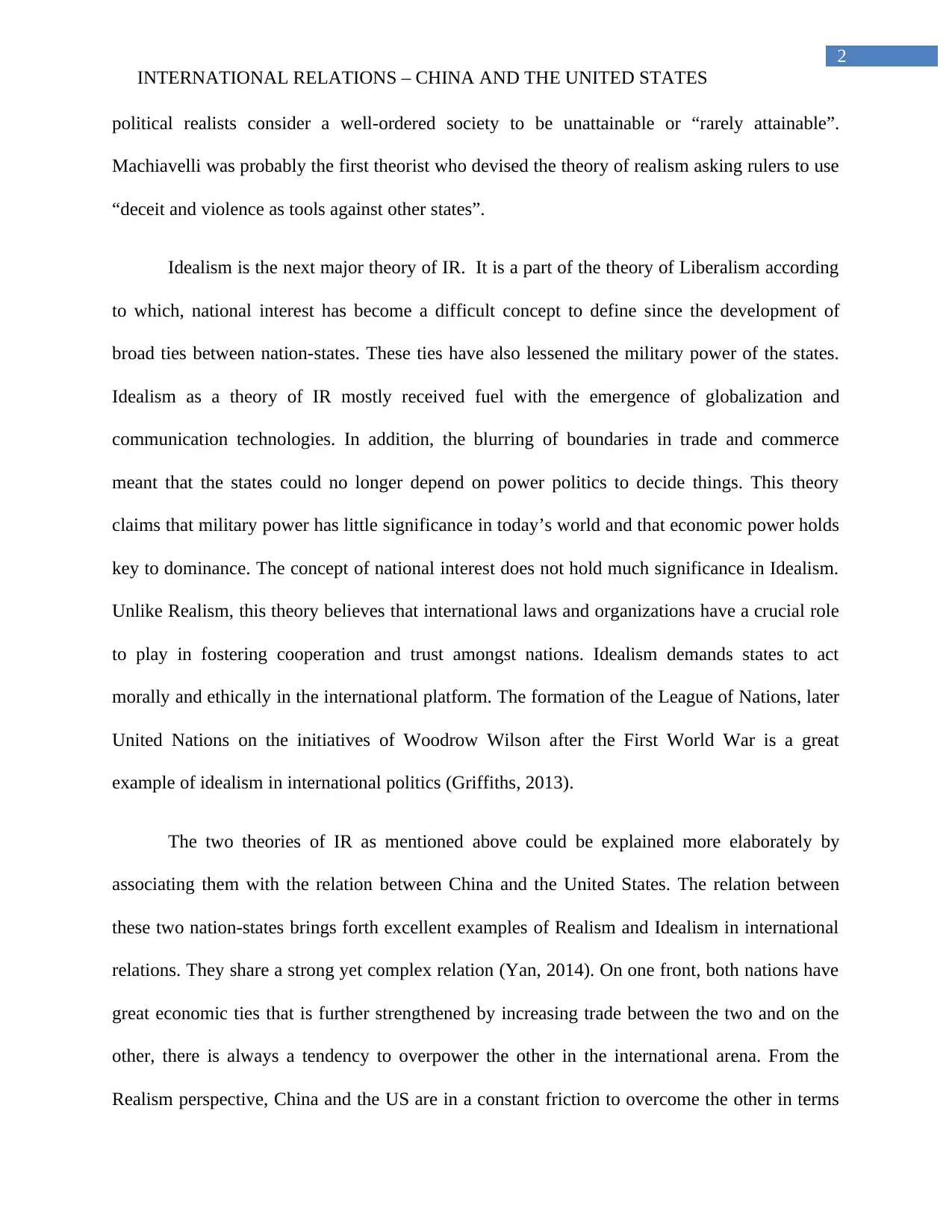
2
INTERNATIONAL RELATIONS – CHINA AND THE UNITED STATES
political realists consider a well-ordered society to be unattainable or “rarely attainable”.
Machiavelli was probably the first theorist who devised the theory of realism asking rulers to use
“deceit and violence as tools against other states”.
Idealism is the next major theory of IR. It is a part of the theory of Liberalism according
to which, national interest has become a difficult concept to define since the development of
broad ties between nation-states. These ties have also lessened the military power of the states.
Idealism as a theory of IR mostly received fuel with the emergence of globalization and
communication technologies. In addition, the blurring of boundaries in trade and commerce
meant that the states could no longer depend on power politics to decide things. This theory
claims that military power has little significance in today’s world and that economic power holds
key to dominance. The concept of national interest does not hold much significance in Idealism.
Unlike Realism, this theory believes that international laws and organizations have a crucial role
to play in fostering cooperation and trust amongst nations. Idealism demands states to act
morally and ethically in the international platform. The formation of the League of Nations, later
United Nations on the initiatives of Woodrow Wilson after the First World War is a great
example of idealism in international politics (Griffiths, 2013).
The two theories of IR as mentioned above could be explained more elaborately by
associating them with the relation between China and the United States. The relation between
these two nation-states brings forth excellent examples of Realism and Idealism in international
relations. They share a strong yet complex relation (Yan, 2014). On one front, both nations have
great economic ties that is further strengthened by increasing trade between the two and on the
other, there is always a tendency to overpower the other in the international arena. From the
Realism perspective, China and the US are in a constant friction to overcome the other in terms
INTERNATIONAL RELATIONS – CHINA AND THE UNITED STATES
political realists consider a well-ordered society to be unattainable or “rarely attainable”.
Machiavelli was probably the first theorist who devised the theory of realism asking rulers to use
“deceit and violence as tools against other states”.
Idealism is the next major theory of IR. It is a part of the theory of Liberalism according
to which, national interest has become a difficult concept to define since the development of
broad ties between nation-states. These ties have also lessened the military power of the states.
Idealism as a theory of IR mostly received fuel with the emergence of globalization and
communication technologies. In addition, the blurring of boundaries in trade and commerce
meant that the states could no longer depend on power politics to decide things. This theory
claims that military power has little significance in today’s world and that economic power holds
key to dominance. The concept of national interest does not hold much significance in Idealism.
Unlike Realism, this theory believes that international laws and organizations have a crucial role
to play in fostering cooperation and trust amongst nations. Idealism demands states to act
morally and ethically in the international platform. The formation of the League of Nations, later
United Nations on the initiatives of Woodrow Wilson after the First World War is a great
example of idealism in international politics (Griffiths, 2013).
The two theories of IR as mentioned above could be explained more elaborately by
associating them with the relation between China and the United States. The relation between
these two nation-states brings forth excellent examples of Realism and Idealism in international
relations. They share a strong yet complex relation (Yan, 2014). On one front, both nations have
great economic ties that is further strengthened by increasing trade between the two and on the
other, there is always a tendency to overpower the other in the international arena. From the
Realism perspective, China and the US are in a constant friction to overcome the other in terms
⊘ This is a preview!⊘
Do you want full access?
Subscribe today to unlock all pages.

Trusted by 1+ million students worldwide
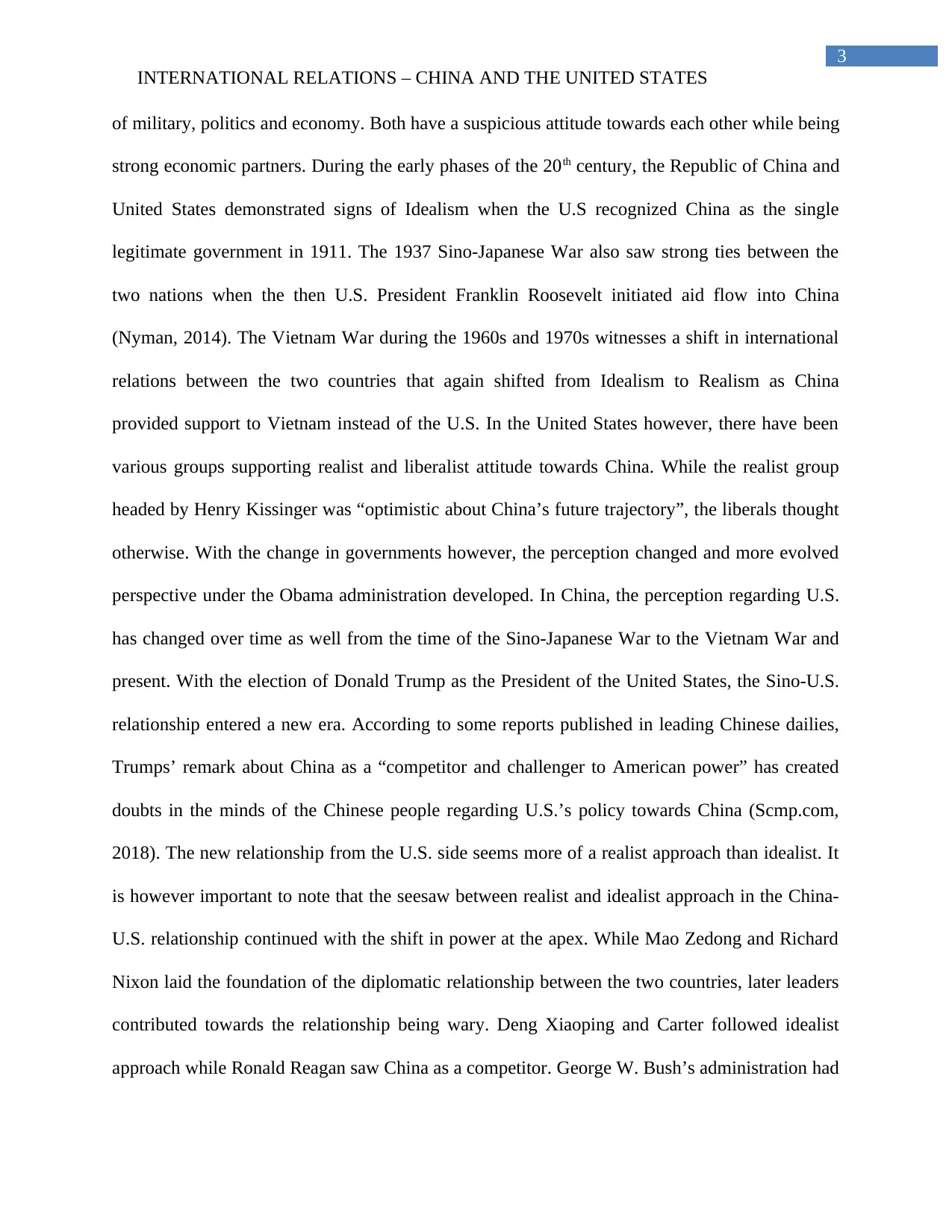
3
INTERNATIONAL RELATIONS – CHINA AND THE UNITED STATES
of military, politics and economy. Both have a suspicious attitude towards each other while being
strong economic partners. During the early phases of the 20th century, the Republic of China and
United States demonstrated signs of Idealism when the U.S recognized China as the single
legitimate government in 1911. The 1937 Sino-Japanese War also saw strong ties between the
two nations when the then U.S. President Franklin Roosevelt initiated aid flow into China
(Nyman, 2014). The Vietnam War during the 1960s and 1970s witnesses a shift in international
relations between the two countries that again shifted from Idealism to Realism as China
provided support to Vietnam instead of the U.S. In the United States however, there have been
various groups supporting realist and liberalist attitude towards China. While the realist group
headed by Henry Kissinger was “optimistic about China’s future trajectory”, the liberals thought
otherwise. With the change in governments however, the perception changed and more evolved
perspective under the Obama administration developed. In China, the perception regarding U.S.
has changed over time as well from the time of the Sino-Japanese War to the Vietnam War and
present. With the election of Donald Trump as the President of the United States, the Sino-U.S.
relationship entered a new era. According to some reports published in leading Chinese dailies,
Trumps’ remark about China as a “competitor and challenger to American power” has created
doubts in the minds of the Chinese people regarding U.S.’s policy towards China (Scmp.com,
2018). The new relationship from the U.S. side seems more of a realist approach than idealist. It
is however important to note that the seesaw between realist and idealist approach in the China-
U.S. relationship continued with the shift in power at the apex. While Mao Zedong and Richard
Nixon laid the foundation of the diplomatic relationship between the two countries, later leaders
contributed towards the relationship being wary. Deng Xiaoping and Carter followed idealist
approach while Ronald Reagan saw China as a competitor. George W. Bush’s administration had
INTERNATIONAL RELATIONS – CHINA AND THE UNITED STATES
of military, politics and economy. Both have a suspicious attitude towards each other while being
strong economic partners. During the early phases of the 20th century, the Republic of China and
United States demonstrated signs of Idealism when the U.S recognized China as the single
legitimate government in 1911. The 1937 Sino-Japanese War also saw strong ties between the
two nations when the then U.S. President Franklin Roosevelt initiated aid flow into China
(Nyman, 2014). The Vietnam War during the 1960s and 1970s witnesses a shift in international
relations between the two countries that again shifted from Idealism to Realism as China
provided support to Vietnam instead of the U.S. In the United States however, there have been
various groups supporting realist and liberalist attitude towards China. While the realist group
headed by Henry Kissinger was “optimistic about China’s future trajectory”, the liberals thought
otherwise. With the change in governments however, the perception changed and more evolved
perspective under the Obama administration developed. In China, the perception regarding U.S.
has changed over time as well from the time of the Sino-Japanese War to the Vietnam War and
present. With the election of Donald Trump as the President of the United States, the Sino-U.S.
relationship entered a new era. According to some reports published in leading Chinese dailies,
Trumps’ remark about China as a “competitor and challenger to American power” has created
doubts in the minds of the Chinese people regarding U.S.’s policy towards China (Scmp.com,
2018). The new relationship from the U.S. side seems more of a realist approach than idealist. It
is however important to note that the seesaw between realist and idealist approach in the China-
U.S. relationship continued with the shift in power at the apex. While Mao Zedong and Richard
Nixon laid the foundation of the diplomatic relationship between the two countries, later leaders
contributed towards the relationship being wary. Deng Xiaoping and Carter followed idealist
approach while Ronald Reagan saw China as a competitor. George W. Bush’s administration had
Paraphrase This Document
Need a fresh take? Get an instant paraphrase of this document with our AI Paraphraser
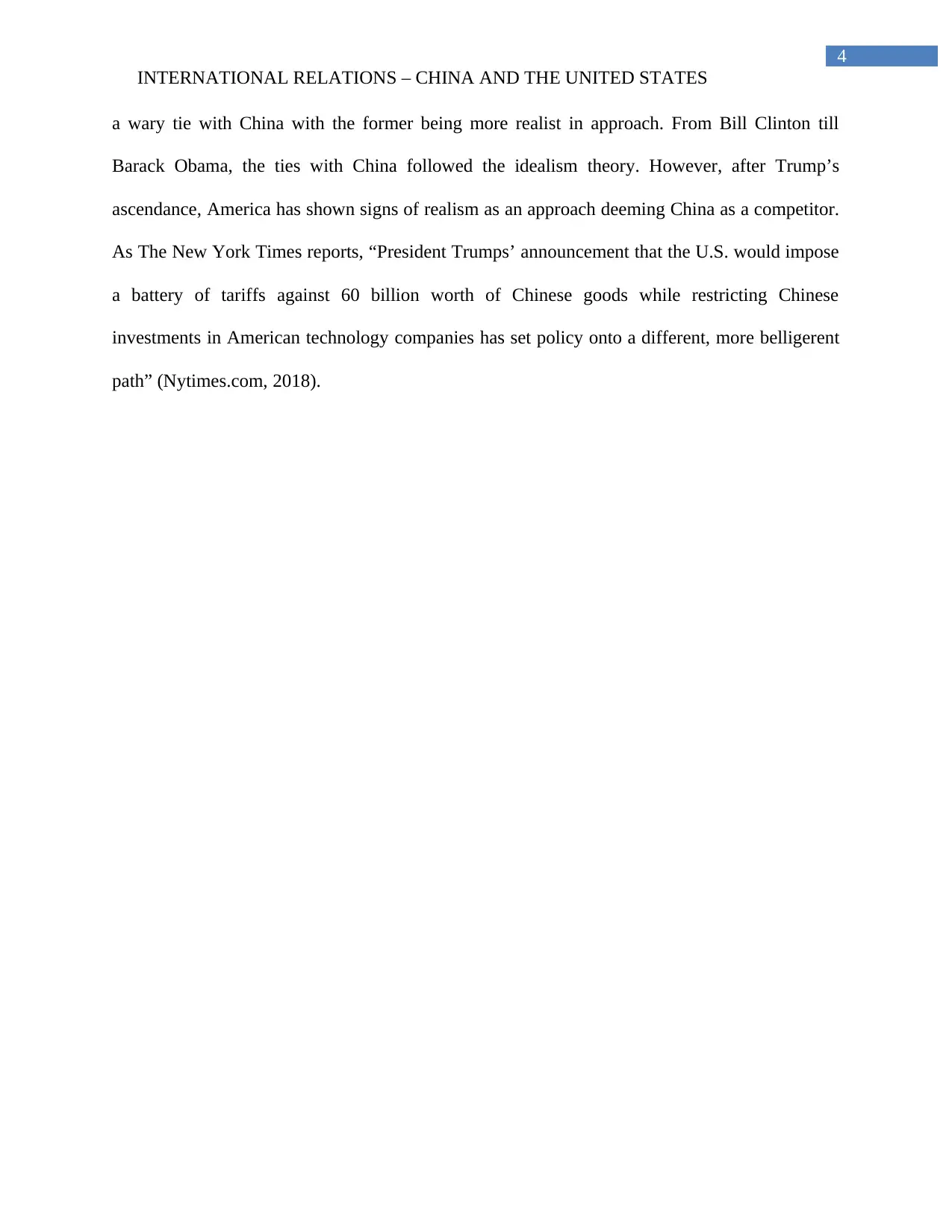
4
INTERNATIONAL RELATIONS – CHINA AND THE UNITED STATES
a wary tie with China with the former being more realist in approach. From Bill Clinton till
Barack Obama, the ties with China followed the idealism theory. However, after Trump’s
ascendance, America has shown signs of realism as an approach deeming China as a competitor.
As The New York Times reports, “President Trumps’ announcement that the U.S. would impose
a battery of tariffs against 60 billion worth of Chinese goods while restricting Chinese
investments in American technology companies has set policy onto a different, more belligerent
path” (Nytimes.com, 2018).
INTERNATIONAL RELATIONS – CHINA AND THE UNITED STATES
a wary tie with China with the former being more realist in approach. From Bill Clinton till
Barack Obama, the ties with China followed the idealism theory. However, after Trump’s
ascendance, America has shown signs of realism as an approach deeming China as a competitor.
As The New York Times reports, “President Trumps’ announcement that the U.S. would impose
a battery of tariffs against 60 billion worth of Chinese goods while restricting Chinese
investments in American technology companies has set policy onto a different, more belligerent
path” (Nytimes.com, 2018).
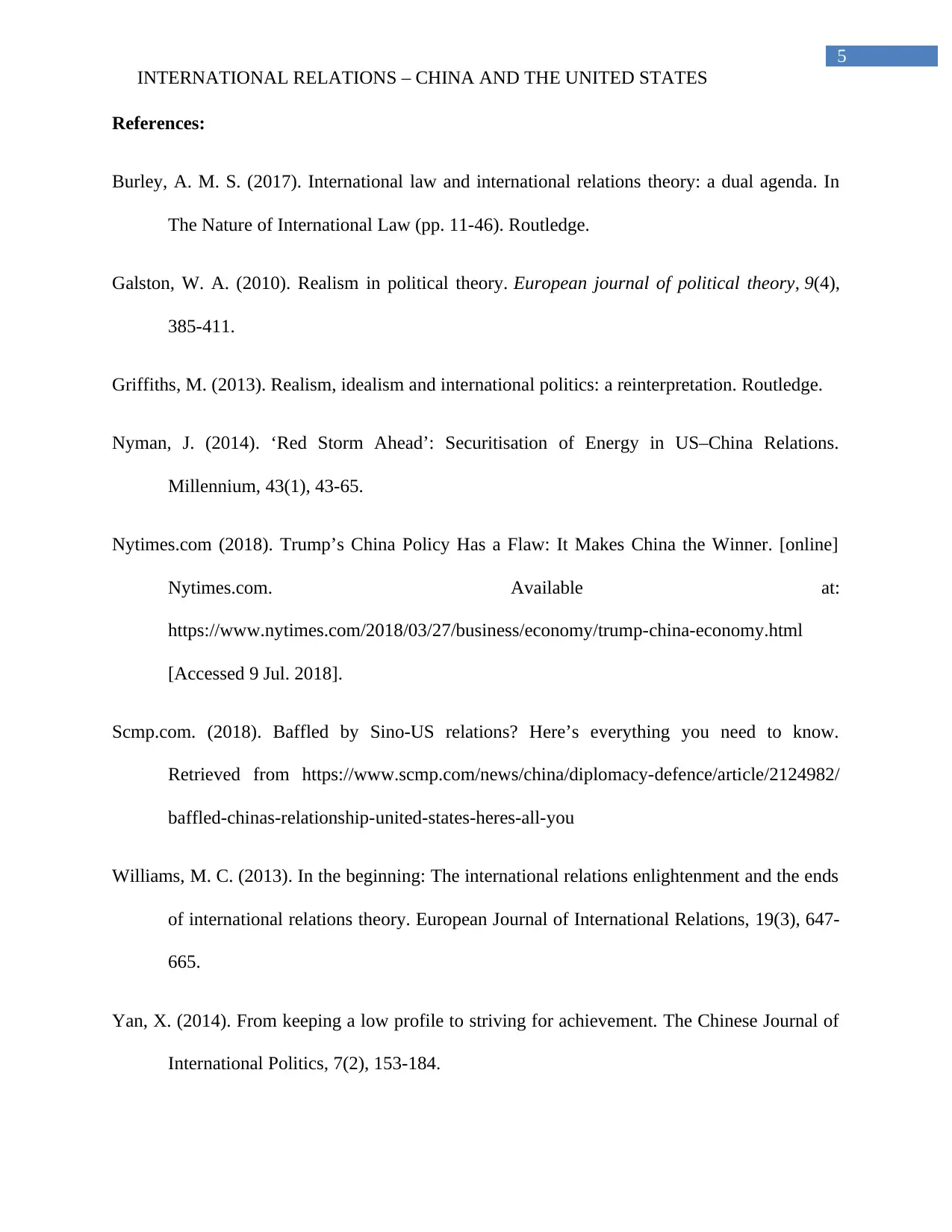
5
INTERNATIONAL RELATIONS – CHINA AND THE UNITED STATES
References:
Burley, A. M. S. (2017). International law and international relations theory: a dual agenda. In
The Nature of International Law (pp. 11-46). Routledge.
Galston, W. A. (2010). Realism in political theory. European journal of political theory, 9(4),
385-411.
Griffiths, M. (2013). Realism, idealism and international politics: a reinterpretation. Routledge.
Nyman, J. (2014). ‘Red Storm Ahead’: Securitisation of Energy in US–China Relations.
Millennium, 43(1), 43-65.
Nytimes.com (2018). Trump’s China Policy Has a Flaw: It Makes China the Winner. [online]
Nytimes.com. Available at:
https://www.nytimes.com/2018/03/27/business/economy/trump-china-economy.html
[Accessed 9 Jul. 2018].
Scmp.com. (2018). Baffled by Sino-US relations? Here’s everything you need to know.
Retrieved from https://www.scmp.com/news/china/diplomacy-defence/article/2124982/
baffled-chinas-relationship-united-states-heres-all-you
Williams, M. C. (2013). In the beginning: The international relations enlightenment and the ends
of international relations theory. European Journal of International Relations, 19(3), 647-
665.
Yan, X. (2014). From keeping a low profile to striving for achievement. The Chinese Journal of
International Politics, 7(2), 153-184.
INTERNATIONAL RELATIONS – CHINA AND THE UNITED STATES
References:
Burley, A. M. S. (2017). International law and international relations theory: a dual agenda. In
The Nature of International Law (pp. 11-46). Routledge.
Galston, W. A. (2010). Realism in political theory. European journal of political theory, 9(4),
385-411.
Griffiths, M. (2013). Realism, idealism and international politics: a reinterpretation. Routledge.
Nyman, J. (2014). ‘Red Storm Ahead’: Securitisation of Energy in US–China Relations.
Millennium, 43(1), 43-65.
Nytimes.com (2018). Trump’s China Policy Has a Flaw: It Makes China the Winner. [online]
Nytimes.com. Available at:
https://www.nytimes.com/2018/03/27/business/economy/trump-china-economy.html
[Accessed 9 Jul. 2018].
Scmp.com. (2018). Baffled by Sino-US relations? Here’s everything you need to know.
Retrieved from https://www.scmp.com/news/china/diplomacy-defence/article/2124982/
baffled-chinas-relationship-united-states-heres-all-you
Williams, M. C. (2013). In the beginning: The international relations enlightenment and the ends
of international relations theory. European Journal of International Relations, 19(3), 647-
665.
Yan, X. (2014). From keeping a low profile to striving for achievement. The Chinese Journal of
International Politics, 7(2), 153-184.
⊘ This is a preview!⊘
Do you want full access?
Subscribe today to unlock all pages.

Trusted by 1+ million students worldwide
1 out of 6
Related Documents
Your All-in-One AI-Powered Toolkit for Academic Success.
+13062052269
info@desklib.com
Available 24*7 on WhatsApp / Email
![[object Object]](/_next/static/media/star-bottom.7253800d.svg)
Unlock your academic potential
Copyright © 2020–2026 A2Z Services. All Rights Reserved. Developed and managed by ZUCOL.





